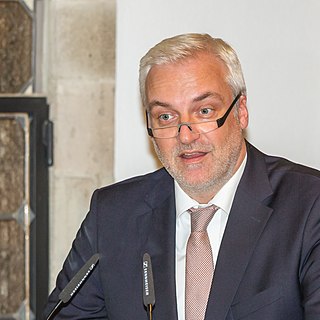
Garrelt Duin is a German politician of the Social Democratic Party (SPD).
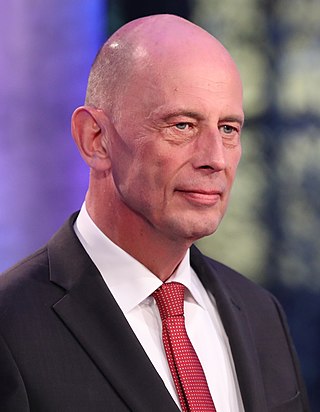
Wolfgang Tiefensee is a German politician of the Social Democratic Party (SPD). He was the Federal Minister for Transport, Building and Urban Development in the grand coalition cabinet led by Angela Merkel between 2005 and 2009. Since 2014, he has been the State Minister of Economy, Science and the Digital Society in the government of Thuringia's Minister-President Bodo Ramelow.

Petra Roth is a German politician of the Christian Democratic Union (CDU). She was the Mayor of Frankfurt from 1995 to 2012. In addition she twice served as president of the Deutscher Städtetag, resuming her previous post there in 2009. The group is the head organization and lobby group for all German cities vis-à-vis the Cabinet of Germany, the German Bundestag, the Bundesrat of Germany, the European Union (EU) and many organizations.

Tarek Mohammed Al-Wazir is a German politician of Alliance '90/The Greens who served as deputy to the Hessian Minister-President, and Hessian Minister of Economics, Energy, Transport and Regional Development from 2014 to 2024. He is a member of the Landtag of Hesse and was co-chair of the Hessian Green Party.

Thorsten Schäfer-Gümbel is a former German politician of the Social Democratic Party (SPD) who has been serving as member of the management board of GIZ since 2019.

Albrecht Schröter is a German politician of the Social Democratic Party of Germany (SPD) who served as mayor (Oberbürgermeister) of Jena from 2006 to 2018.
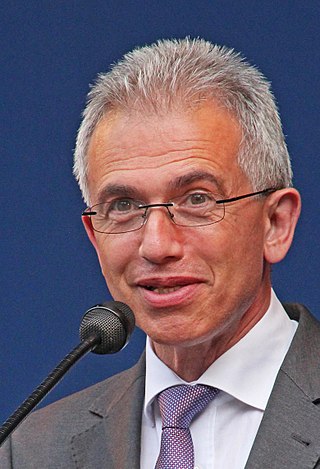
Peter Manuel Feldmann is a German politician of the Social Democratic Party (SPD). On 25 March 2012, he was elected Mayor of Frankfurt as successor of Petra Roth (CDU). On 6 November 2022, he was recalled, with 95% of the vote against him, and he left office on 11 November 2022.

Stephan Weil is a German politician and the leader of the Social Democratic Party in Lower Saxony. On 20 January 2013, the SPD and the Green party won the 2013 Lower Saxony state election by one seat. On 19 February 2013, he was elected Minister President of Lower Saxony with the votes of SPD and Alliance '90/The Greens. From 1 November 2013 until 31 October 2014 he was President of the Bundesrat and ex officio deputy to the President of Germany. In November 2017, he was again elected Minister President with the votes of SPD and CDU.

Carsten Schneider is a German politician of the Social Democratic Party (SPD) who has been serving as a member of the German Parliament since 1998. Since 2021, he has also been serving as Parliamentary State Secretary for East Germany and Equivalent Living Conditions in Chancellor Olaf Scholz's cabinet.
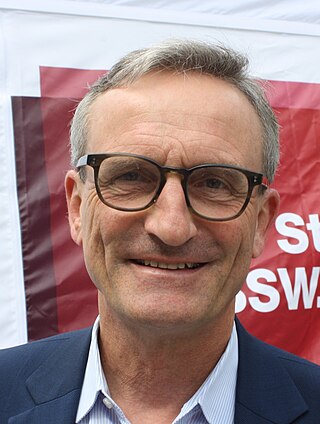
Thomas Geisel is a German politician from the Bündnis Sahra Wagenknecht party and former member of the Social Democratic Party. Together with Fabio Di Masi he is running for European Parliament election in 2024 for BSW.

Christoph Matschie is a German politician of the Social Democratic Party (SPD) who served as Deputy Minister-President of Thuringia between 2009 and 2014. He was also a member of the Bundestag from 1999 to 2004 and from 2017 to 2021.

Ursula Groden-Kranich is a German politician of the Christian Democratic Union of Germany (CDU) who served as a member of the Bundestag from 2013 to 2021, representing the constituency of Mainz. She is also a member of Mainz City Council and was the local representative for Mainz-Hechtsheim between 2004 and 2014.
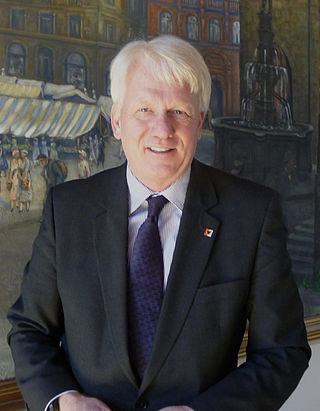
Ullrich Sierau is a German politician from the Social Democratic Party of Germany and, since 15 June 2014, for the third time, has been the lord mayor of Dortmund. After retaining this position already from 21 October 2009 to 18 January 2010, he was re-elected in an election on May 9, 2010 repeat election of the mayor elections in 2009 for mayor of Dortmund. His term would last until 2016. In the local elections in North Rhine-Westphalia in 2014, Sierau approached again, reaching a vote share of 43.7%. When carried out in the June 15, 2014 runoff he, then reached 51.6% of the vote, his opposition candidate Annette Littmann from the Christian Democratic Union of Germany, who received 32.0% in the first ballot, subjected to 48.4%.
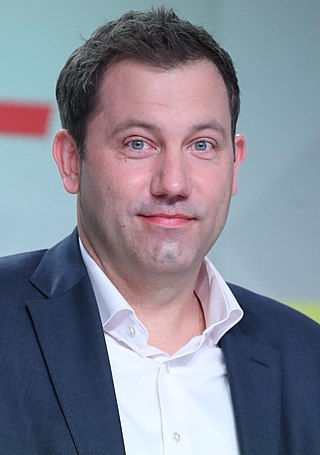
Lars Klingbeil is a German politician of the Social Democratic Party (SPD) who has been serving as the party's Co-Leader since 2021, together with Saskia Esken.
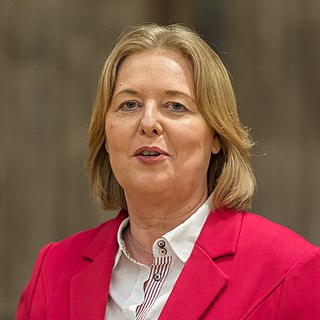
Bärbel Bas is a German politician of the Social Democratic Party (SPD) who has been serving as the 14th president of the Bundestag since 2021. She has been a member of the German Bundestag since the federal election in 2009. She served as the deputy chairwoman of the SPD parliamentary group under the leadership of chairman Rolf Mützenich from 2019 to 2021.

Norbert Walter-Borjans is a German economist and politician of the Social Democratic Party (SPD) who served as co-leader of the SPD from 2019 to 2021. He served as State Minister of Finance of North Rhine-Westphalia from 2010 until 2017.

Christian Hirte is a German lawyer and politician of the Christian Democratic Union (CDU) who has been serving as member of the German Bundestag since 2008. From 2020 to 2022, he has been the chairman of the CDU in Thuringia and co-deputy Chairman since then.

Ashok-Alexander Sridharan is a German politician partly of Indian ancestry who served as Mayor of Bonn from 2015 until 2020. He is a member of the Christian Democratic Union of Germany (CDU). He was the first mayor of Bonn to be of an immigrant background.

Susanne Hennig-Wellsow is a German politician. She was federal co-chairwoman of The Left from 2021 to 2022 and has served as a member of the Bundestag for Thuringia since 2021. Previously, she was a member of the Landtag of Thuringia from 2004 to 2021, leader of the Thuringia branch of The Left since November 2013, and leader of the state parliamentary group since December 2014.
Gerd Schuchardt is an electrical engineer who built his career and reputation in East Germany before 1990 in microprocessor technology and related forward-looking branches of science. He was interested in politics, but had avoided involvement in the country's ruling SED (party) or any of the various so-called "bloc parties" which it controlled. In January 1990, with the winds of political change - somewhat implausibly, as many still thought at the time - blowing across from the Kremlin in Moscow, the party leaders in East Berlin no longer felt able to stand against domestic pressures for a return to democratic politics after more than half a century of one-party dictatorship. Gerd Schuchardt became an activist member of the re-awakening Social Democratic Party. After reunification in October 1990 state-level democratic politics returned to Thuringia: Schuchardt became a leading figure in Thuringian state politics, selected by party members as the Social Democratic Party's lead candidate in the 1994 Thuringian state election. He led his party to what turned out to be its best electoral result in Thuringia to date. In the resulting "Grand coalition" government that ensued he served as vice-minister-president until 1999 under the leadership of Bernhard Vogel (CDU) and as Minister for the Sciences, Research and the Arts.



















